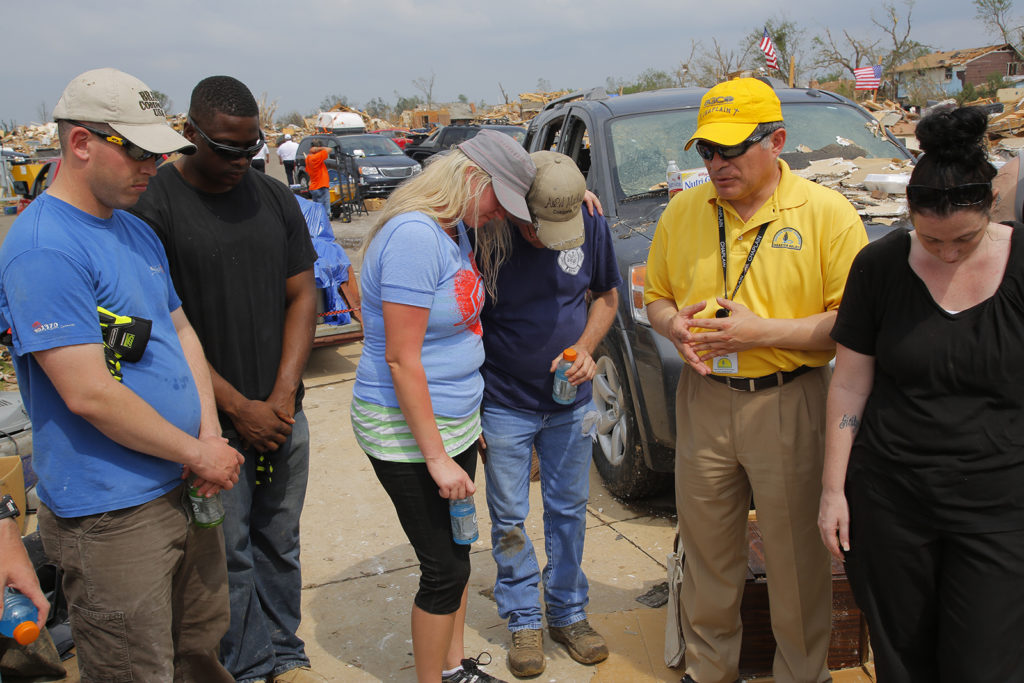LAS VEGAS—The people of North America are hurting. After a slew of natural disasters along the Gulf Coast and Florida panhandle and a shooting massacre in Las Vegas during a country concert, compassion and hope for a better tomorrow may seem like a distant dream.
But that’s why the Southern Baptist Convention (SBC) and North American Mission Board (NAMB)’s chaplains exist—to walk the frontlines of crisis and extend God’s kindness to those in need.
Love for Vegas
“A lot of chaplains from all over the country called to offer help after the senseless Vegas shooting,” said Sam Stanton, Nevada Disaster Relief (DR) director and chaplain. “People were willing to come and serve. That’s part of the nature of chaplains, though. No matter the mess, they’re ready to step in and lend a listening ear or helping hand.”
According to Stanton, those who offered to help would not have been able to gain access to the survivors or to the victims’ families.
“So, we did what we could with who we had,” Stanton said. “There were three of us who had very good partnerships with the Las Vegas Metropolitan Police Department and were able to get to talk with people. The police department and all the officers are doing a great job handling this difficult situation. They seemed to have it covered. But, they let us into the hotel next to the one where the shooter holed himself up. There we were able to speak with eye-witnesses and hotel staff who were traumatized by what should have been an ordinary night.”
Stanton, accompanied by California Disaster Relief (DR) Director, Mike Bivins and Tim Patton, an associate pastor of South Reno Baptist Church, provided chaplain services to those needing or able to talk.
“Even the police stationed around the hotels after the shooting wanted to talk,” said Stanton. “One young officer had arrived on scene during the shooter’s second round of rapid fire. He remembered running very carefully but quickly to get people to safety. He was about to become a father, and yet there he was, running to save others’ lives as bullets tore through tents around him.”
While some just needed to talk, others couldn’t even form the words. Grief was holding on too tight.
“The real heartbreaking stories were from those we talked to at the resource center,” Stanton recalled. “People were making arrangements to get their loved ones’ bodies. It was there we heard some of the most tragic and unimaginable stories.”
One man was there to pick up his 33-year-old daughter’s body.
“He was in a corner all by himself, covered in grief,” said Stanton. “I talked to him but not to provide answers. I knew the only thing I could do was make sure he knew he was loved and that I cared about him.”
Stanton and Bivins normally provide chaplain services during natural disasters—hurricanes, tornados, floods, earthquakes and landslides. This kind of needed response was new to them.
“This kind of response is so different because everyone here is a victim,” Stanton said. “In a natural disaster, people lose their homes, their sense of security. But they hardly ever lose loved ones. Some do, but not like this. We met a young man whose wife of seven years had died in his arms. He was not inclined to hear about God. He was so angry.”
Yet Stanton said all he and the other Southern Baptist chaplains could do was make sure the young widower had resources and people around him. It’s part of disaster response protocol.
“His relatives had come from Mexico to be with him,” said Stanton. “All I could do was express my appreciation to them for being there for him. At the moment, it might just seem dark and like we are all alone. But God really does care. This was an act of evil. And the Lord has a good and mighty way of turning things around. I was grateful to have Mike and Tim with me, too.”
Bivins, who Stanton thanked earlier, said he’d never experienced anything like it.
“Though I did not deploy to 9-11, I knew instantly upon being in Vegas that this was going to be very different,” said Bivins. “Both were terrible tragedies but 9-11 had motive behind it. The shooting in Vegas made no sense. It was a violation of humans rights and everyone from Nevada natives to survivors to victims’ friends and families felt that way.”
But having a chaplain presence at the resource center soothed those identifying body parts and those who had to make tough decisions about the deceased.
“Everyone was impacted by this,” Bivins said. “People are responding to us, to the police and to each other in emotional ways. We’re all confused. There were times talking to people when I felt inadequate in my response. Yet, God is bigger than this. His love conquers all fear. And the police are doing a great job. Maybe for now the answer is in people loving people, taking care of one another in the midst of tragedy.”
Published October 20, 2017
